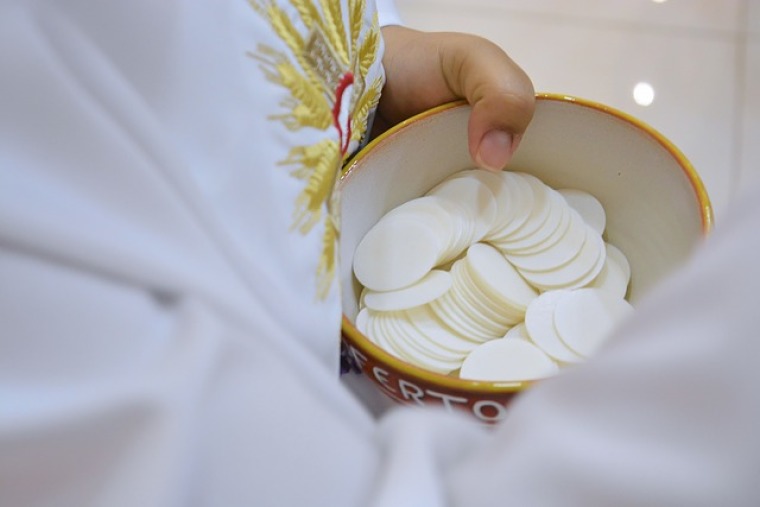Pope Francis: No communion for Catholics in state of mortal sin

Pope Francis has warned that Catholics would not be allowed receive Holy Communion if they have committed a mortal sin, unless they have been to confession.
"We know that one who has committed a serious sin should not approach Holy Communion without having first obtained absolution in the sacrament of Reconciliation," the pope told Polish pilgrims in his General Audience on Wednesday, as reported by The Catholic Herald.
"Lent is an opportunity to approach the latter, to confess well and to encounter Christ in Holy Communion. The encounter with Him gives meaning to our life," he added.
The pope went on to stress that the words "our daily bread" refer "not only to food for our body but also Eucharistic bread, food for the soul." The prayer was meant to open up the heart of people to forgive others as they have received forgiveness from God, the pope said.
"Forgiving people who have offended us is not easy," Francis pointed out, adding that people must also ask the Lord to "teach me to forgive as you have forgiven me."
The pontiff further noted that the prayer prepares people for the rite of peace in which the celebrant prays that the peace of Christ will fill people's hearts and, as a sign of hope, the assembly exchanges a concrete sign of peace.
He stressed that the expression of ecclesial communion and being reconciled in mutual fraternal love is an important part of the preparation before receiving the Communion.
"Christ's peace cannot take root in a heart incapable of living in fraternity (with others) and of piecing it back together after it has been wounded," he said.
In his prayer, Francis had hoped that celebrating the rites with greater understanding would lead people to experience the Eucharist more fully as the sacrament of their communion with God and with their brothers and sisters.
The pope's clarity in explaining the proper reception of the Holy Communion during his papal audience on Wednesday stands in contrast to his exhortation on marriage and family, Amoris Laetitia, which some say contains doctrinal ambiguities.
Published in 2016, the document was said to have led some diocese around the world to allow divorced and civilly remarried Catholics to receive the Eucharist in certain situations.
Since the release of the document, some bishops and bishops' groups in Argentina, Malta, Germany and Belgium have issued pastoral instructions allowing for civilly divorced and remarried Catholics to receive Communion, in defiance of the Catholic Church's longstanding practice.
 Christians don't have to affirm transgenderism, but they can’t express that view at work: tribunal
Christians don't have to affirm transgenderism, but they can’t express that view at work: tribunal Archaeology discovery: Medieval Christian prayer beads found on Holy Island
Archaeology discovery: Medieval Christian prayer beads found on Holy Island Presbyterian Church in America votes to leave National Association of Evangelicals
Presbyterian Church in America votes to leave National Association of Evangelicals Over 50 killed in 'vile and satanic' attack at Nigerian church on Pentecost Sunday
Over 50 killed in 'vile and satanic' attack at Nigerian church on Pentecost Sunday Ukrainian Orthodox Church severs ties with Moscow over Patriarch Kirill's support for Putin's war
Ukrainian Orthodox Church severs ties with Moscow over Patriarch Kirill's support for Putin's war Islamic State kills 20 Nigerian Christians as revenge for US airstrike
Islamic State kills 20 Nigerian Christians as revenge for US airstrike Man who served 33 years in prison for murder leads inmates to Christ
Man who served 33 years in prison for murder leads inmates to Christ


 Nigerian student beaten to death, body burned over ‘blasphemous’ WhatsApp message
Nigerian student beaten to death, body burned over ‘blasphemous’ WhatsApp message 'A new low': World reacts after Hong Kong arrests 90-year-old Cardinal Joseph Zen
'A new low': World reacts after Hong Kong arrests 90-year-old Cardinal Joseph Zen Iran sentences Christian man to 10 years in prison for hosting house church worship gathering
Iran sentences Christian man to 10 years in prison for hosting house church worship gathering French Guyana: Pastor shot dead, church set on fire after meeting delegation of Evangelicals
French Guyana: Pastor shot dead, church set on fire after meeting delegation of Evangelicals ‘Talking Jesus’ report finds only 6% of UK adults identify as practicing Christians
‘Talking Jesus’ report finds only 6% of UK adults identify as practicing Christians Mission Eurasia ministry center blown up in Ukraine, hundreds of Bibles destroyed: 'God will provide'
Mission Eurasia ministry center blown up in Ukraine, hundreds of Bibles destroyed: 'God will provide' Church holds service for first time after ISIS desecrated it 8 years ago
Church holds service for first time after ISIS desecrated it 8 years ago Burger King apologizes for 'offensive campaign' using Jesus' words at the Last Supper
Burger King apologizes for 'offensive campaign' using Jesus' words at the Last Supper Uganda: Muslims abduct teacher, burn him inside mosque for praying in Christ’s name
Uganda: Muslims abduct teacher, burn him inside mosque for praying in Christ’s name